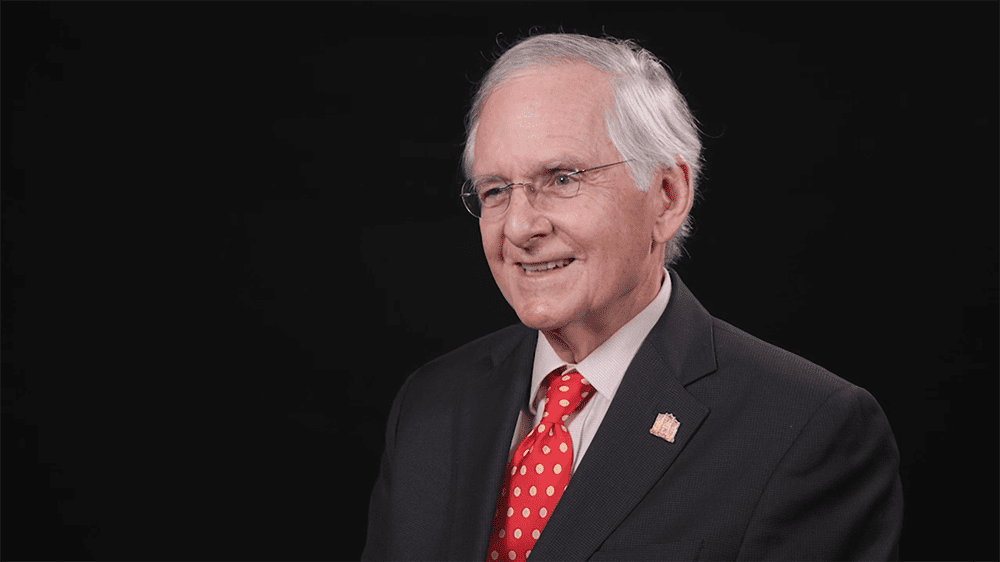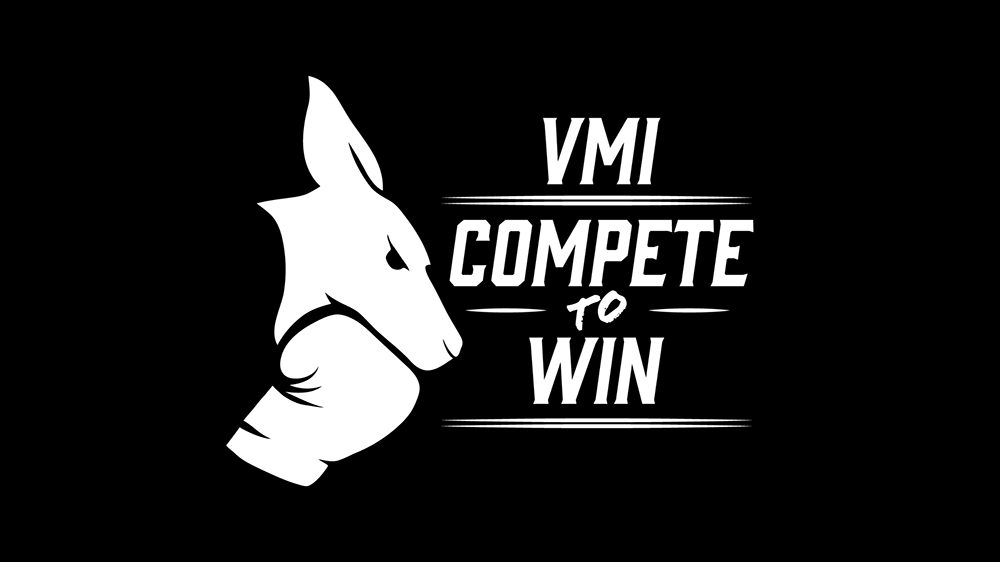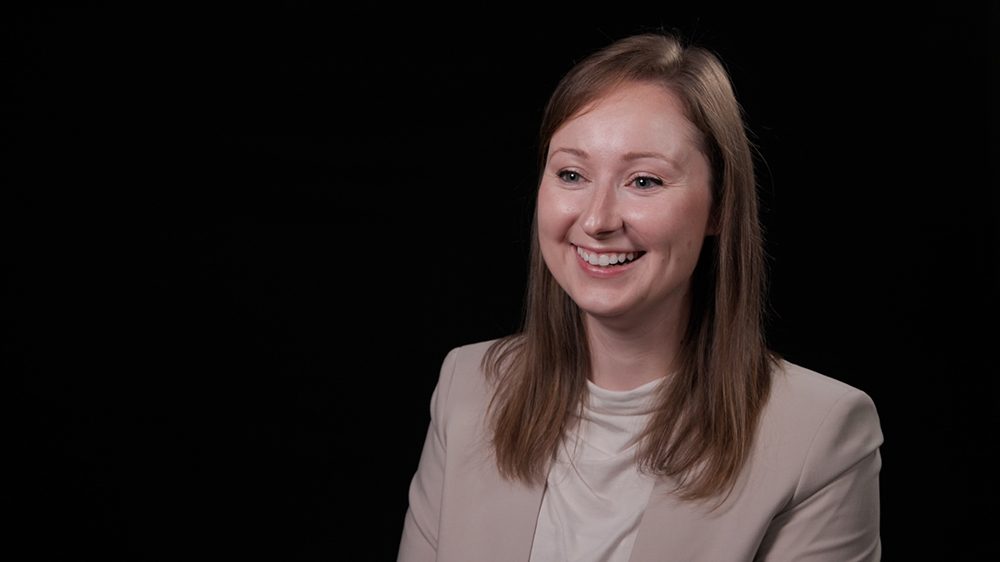Thomas K. Norment ’68, who served for 32 years representing the 3rd Senatorial District in the Senate of Virginia, is a “grateful man.” He is grateful for the opportunity to serve what he considers his hometown, as the 3rd District encompasses James City County-Williamsburg, Gloucester, and New Kent County. “My family moved from Richmond to the Williamsburg area when I was about 10,” he explained. It was from there he matriculated at VMI in 1964. When he graduated from VMI, he knew he wanted to continue to make Williamsburg his home. So, he attended the Marshall Wythe Law School at the College of William & Mary, where he subsequently taught as an adjunct professor for 11 years. He had very limited resources, and he worked year-round as a waiter at Colonial Williamsburg King’s Arms Tavern. Years later, he had the privilege of serving on the Colonial Williamsburg Board of Trustees as the first “local” in 30 years with a unique perspective.
Norment began his career in “public service” (some call it “politics”) with 4 years of service on the James City County Board of Supervisors from 1987–91, where he served as chairman in 1991, when he was elected to the Senate of Virginia. During the next 32 years, he became the longest-serving Republican senator in the history of Virginia and had the longest tenure of a Republican leader in the Senate. He said he was just “lucky” and has a feeling of gratitude that “the voters and my colleagues believed in me.”
Like many, Norment was a reluctant entrant to the public service arena, where long hours, restless nights, and occasional personal attacks are not uncommon.
During summer 1991, three prominent Virginia politicians—Congressman Herb Bateman, U.S. Sen. John Warner, and U.S. Sen. Paul Trible—all called Norment and urged him to run for the Senate of Virginia. Initially, he was hesitant. But, after consulting his family and thinking about the nature of the office, he decided to run. He explains, “I enjoyed being a supervisor. But at the time, Virginia was rapidly evolving in many ways. Moving into state government presented a great and comprehensive intellectual challenge—one I couldn’t resist. I thrive on challenges!”
When he entered the Senate of Virginia in 1992, Norment encountered the same issues he had as a supervisor but on a much larger scale. “When it came to roads, I had to think about big projects like the third Hampton Roads crossing and how it and others like it affected Virginia’s entire transportation system. As much as I was committed to my constituents—after all, they voted for me—I had a broader commitment to the Commonwealth. I had to be mindful that however I voted and led, the Senate would affect all of Virginia.”
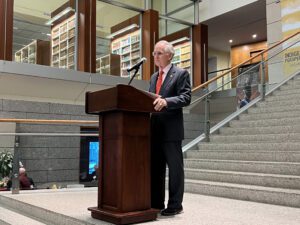
Thomas K. Norment ’68 speaks at the 2024 VMI Legislative Reception at the Library of Virginia in Richmond Feb. 22, 2024.—Photo courtesy VMI Communications & Marketing.
Norment is grateful for the opportunity to serve Virginia when he did. “I was blessed to be involved with many significant issues. I am proud of the work I did with criminal justice reform, budgetary issues, and higher education,” Norment remembers. “I still highly value my involvement with the Joint Legislative Audit and Review Commission—or JLARC—which acts as a nonpartisan ‘think tank’ for the General Assembly and the rough equivalent of Congress’ Government Accounting Office, which helps legislators in their critical work of oversight. It is an incredibly well-managed resource for legislators.”
It was in the realm of higher education that Norment feels he impacted the most positive change for the largest number of citizens. “From a legislative perspective, I am most proud of what we in the General Assembly did with the reform of higher education in 2005,” he recalled. “The legislation we passed created three tiers of autonomy within the system and provided some of the larger and well-established institutions more flexibility to operate and make them less dependent on state direction and state funding.”
In a career spanning more than three decades of public service, there are bound to be those special moments where time seems to stand still—and Norment’s career was no exception.
He proudly remembers his involvement with two commemorations of seminal events in Virginia history where he served as chairman. One of them was the 2007 international exposition that marked the 400th anniversary of the establishment of Jamestown. “During that event, I attended a luncheon for Queen Elizabeth II, who was the honored guest. And several days later, I introduced the president of the United States. If you said back when I was growing up in James City County that one day I would do that, there is no way most people I knew would have believed it. To this day, I have a hard time believing it myself!”
Twelve years later, Norment had a key role in commemorations of the events of 1619 in Virginia. “That year saw the arrival of Africans, sadly as slaves, and women in Virginia and the establishment of the House of Burgesses, the first legislature in what became the United States. “Our keynote speaker was Vice President Dick Cheney, who I had the privilege of introducing and befriending. It was that introduction that vividly reminded me how humbled and grateful I am to have personally met so many extraordinary individuals during my public service career, to include the Dalai Lama; Desmond Tutu; Presidents H.W. Bush and his son, George W. Bush; Justices Sandra Day O’Connor, Anthony Kennedy, and Neil Gorsuch; Speaker of the House of Commons John Simon Bercow; and President Trump. In reflection, it is unbelievable that a boy from James City County with a modest background would have these wonderful memories. I am beyond grateful.”
Even while his duties in Richmond occupied much of his waking hours, not to mention his mental energy, Norment still found time to give back to his alma mater. He is thankful he had the opportunity to work closely with Gen. J.H. Binford Peay III ’62 during a defining time at the Institute. Under Peay’s direction, VMI launched Vision 2039, a bold plan with the goal of moving the Institute to the top tier of higher education in Virginia and the country.
“Working with General Peay was an extraordinary experience,” he remembers. It was not his first time meeting the Institute’s 14th superintendent, as that had occurred much earlier. “As I said earlier, I spent the first 10 years of my life in Richmond. I got to know him then, as he briefly dated my sister. Also, I knew him as a Boy Scout leader and camp counselor. He was as impressive as a young man as he was later in life as an exceptional career soldier and our superintendent.”
It was during his time as a trustee of the VMI Foundation from 1997–2005 that Norment again met Peay. “One of the highlights of my Foundation service was becoming reacquainted with General Peay. He became a trustee a year or two after I did, and we rekindled our relationship. It was easy, as we were kindred spirits, and we spent lots of quality time together. And that time made our later collaboration on VMI’s behalf more effective.”
“What are you doing to improve VMI as a higher education institution of excellence? Don’t try to tear it down, and don’t hurt it. ... you may disagree, but do not disagree destructively.”
Thomas K. Norment ’68
Col. Kimberly C. Parker, the Institute’s government relations director, had what she termed “a front-row seat to the partnership that Senator Norment and General Peay enjoyed. The senator embraced General Peay’s vision for the Institute and worked with him to make it a reality. He always stood ready to assist in the pursuit of resources as legitimate needs were identified within the strategic framework of Vision 2039.”
While Vision 2039 improved every aspect of VMI’s educational experience, its most visible component was the broad program of improvements to VMI’s capital facilities. “General Peay and I were committed to providing future cadets with world-class facilities—buildings like Scott Shipp Hall and Maury-Brooke Hall were renovated, as were Old and New Barracks. New construction included the Corps Physical Training Facility and Aquatic Center and Third Barracks. These capital improvements were funded largely with state funds appropriated by the General Assembly.”
According to Norment, the funding of Third Barracks underscored the extraordinary nature of VMI’s educational opportunities. “At state colleges and universities, dormitories cannot be paid for with state funds. A school must borrow the money and service the debt through increased tuition and fees. We managed to convince the appropriations committees that because VMI’s co-curriculum education is an integral part of the VMI education experience—and that barracks is the center of the co-curriculum—the project deserved direct funding.”
Norment also helped the Institute attain funding for other activities, such as additional faculty and staff positions, compensation increases for faculty, and additional money for unique military programs. He candidly acknowledges he could not have facilitated any of these accomplishments without the insightful guidance and unwavering support of Parker and Brig. Gen. Dallas Clark ’99, deputy superintendent for finance and support.
But, Parker states, that’s not the end of it. “I appreciate that the senator always made time for me as I encountered challenges in my work. As busy as his days were during the legislative sessions, he was consistently accessible to offer advice and insight. I will always be grateful to him for his friendship. I am better at the work I do because of his guidance over the years.”
In recognition for his many outstanding contributions to the Institute, the VMI Foundation presented Norment with its highest honor, the Distinguished Service Award, in 2007. Much of his sense of gratitude is in what the Institute did for him. “The education in character building is priceless. I learned, for example, that whenever you fall short, you must own it. And, I have taken ownership of my mistakes, and that is incredibly important in building trust with others. My sense of self-discipline I attribute to VMI, as well. As I have said before, VMI’s co-curricular system also taught me time management skills. Basically, if you want to survive 4 years in barracks, you need to learn them. It wasn’t—and isn’t—taught formally, but cadets learn it or depart.”
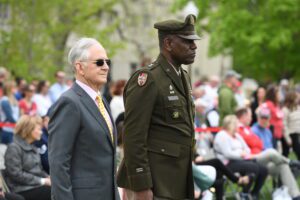
VMI honors former Virginia Sen. Thomas K. Norment Jr. ’68 for his 30 years of service to the Commonwealth of Virginia with a parade on post April 26, 2024. Norment takes review of the Corps of Cadets along with Maj. Gen. Cedric T. Wins ’85, superintendent.—VMI Photo by Kelly Nye.
And why does Norment feel that VMI is important to the Commonwealth and the country? “Well, it’s right there on the parapet for all to read: ‘Fair specimens of citizen-soldiers,’” he replied. “That’s what we produce and have for more than 180 years. Again, General Peay had an extremely distinguished military career and as a business executive who returned to post to serve VMI. General John Jumper ’66 was the chief of staff of the Air Force, the fourth alumnus to be the chief of a service. He then enjoyed success in business, and he now heads the State Council on Higher Education for Virginia.”
He pointed to three other alumni as examples of younger graduates who are making important contributions to Virginia and the nation. “Major General James Ring ’88 has been adjutant general of Virginia since 2014, and he has done a fantastic job in that position. Governor Youngkin named Brigadier General Russell McGuire ’96 as an assistant adjutant general. And, speaking of the Class of 1996, Michael Waltz is now the national security adviser to the president, which puts him in the company of such people as Henry Kissinger and Colin Powell. Think about that.”
With VMI resolutely focused on continuing its historic mission, Norment is bullish on it and the Institute’s future. “I have admiration for Major General Wins ’85. Just like General Peay, he answered the call of duty and accepted the responsibility of leading VMI at a challenging moment in its history that others created.
“General Wins navigated us through a difficult time and now has set out his own strategic plan, Forging 21st Century Leaders. Its overall goal is a simple and admirable one: To ensure VMI will remain ‘an anchor in an ever-changing world.’ And what can be wrong with that approach?
“I know firsthand as a leader you are never immune from criticism—nor should you expect to be. There are always individuals who think they can do a better job than you. I am concerned, however, about the nature of some of the current public criticism of VMI. As to any criticism, it is always prudent to objectively study the issues and moderate your public comments. Those comments can have unintended consequences in the public arena.”
It is this mean-spirited criticism that Norment feels is least constructive. “The entire VMI family needs to be reminded the governor of Virginia is VMI’s commander-in-chief, and his policies are the equivalent of military orders; the General Assembly is the largest single donor of appropriations every year of our existence.
“When I hear things like, ‘We’re going to file suit against the Alumni Association,’ We’re going to withhold donations,’ and, ‘We’re not sending our kids to VMI,’ I really have very little patience for it. What are you doing to improve VMI as a higher education institution of excellence? Don’t try to tear it down, and don’t hurt it. Don’t presume you know better than our board who should be superintendent or who should be commandant. We have committed individuals who are charged with governance and fiduciary responsibilities, and they make those decisions. And you may disagree, but do not disagree destructively.”
In closing, Norment stated, “If I could convince my fellow alumni of one thing, it would be to embrace public service in some form, especially in elected office and, specifically, in the General Assembly. There is only one VMI graduate in the General Assembly now. The qualities that VMI alumni embrace are the same qualities we want our elected officials to embrace, and VMI graduates would be excellent public servants demonstrating our value to Virginia. And, like any competitive activity, you must have players on the field in order to win! Go VMI and win!”
-

Scott Belliveau '83 Communications Officer - Executive Projects
The communications officer supports the strategy for all communications, including web content, public relations messages and collateral pieces in order to articulate and promote the mission of the VMI Alumni Agencies and promote philanthropy among varied constituencies.

Christian Heilman Director of Digital Content
The director of digital content is responsible for creating original video and multimedia materials, as well as developing and editing web and digital content. The director is responsible for platform coordination and troubleshooting, to include the VMI Alumni Agencies’ primary websites, digital newsletter and other digital platforms.

